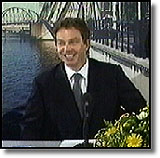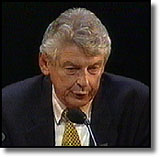
|
Blair Claims Summit SuccessAfter hard negotiations stretching into the dawn, European Union leaders have cobbled together a new treaty designed to reshape the organisation.But they failed to agree on how to reform the EU's decision-making system to prepare for the admission of new member states from eastern Europe The Prime Minister said British aims in the negotiations on a new European treaty had been met, with borders remaining under national control, plans to give the EU a defence role resisted and a deal on fishing in the bag. Mr Blair emerged in the early hours still smiling despite a gruelling two-day meeting of EU leaders including an 18-hour marathon final session. "We were fighting on the ground we should be fighting on, protecting our interests in the way we should be protecting our interests, not causing a fuss for the sake of it," said Mr Blair. "As a result of that, I think that we secured every single objective we came here for," he continued.
The new treaty will disappoint many who wanted to see a significant move towards political integration. The heads of government gave up the attempt to reform the European Union's decision-making system, which at present favours small member states. This was seen as crucial before the EU expands into eastern Europe. Now changes to the balance of power in the fifteen-nation union has been put off until new members join early next century. The Dutch Prime Minister, Wim Kok, admitted the new treaty was modest fare. "In some areas we did not achieve as much as we proposed," he said.
"The message is that we want to open the door of our European house for new members provided that these new members are really ready in every respect," added Mr Kok. "We have to be ready ourselves and they have to be ready." Plans by France and Germany to give the EU a military role, after its failure in Bosnia, were watered down on the insistence of Britain and the neutral countries. There will be greater co-ordination of foreign policy, but it does not amount to the EU starting to play a big political role on the world stage A scheme for passport-free travel throughout the Union was only passed after the Prime Minister and his Irish and Danish counterparts secured exemptions. The summit also left unresolved a dispute over the voting power to be allocated to each member state. Britain and the other large countries had pushed for a stronger voice in EU decisions. But the small countries objected and the plan, which was meant to pave the way for the EU's expansion into eastern Europe, has had to be deferred. The largely fudged deal added to the woes of the EU at a summit overshadowed from the start by a Franco-German row over the arrangements for a single currency. Although the currency dispute was smoothed over on Monday, linking French demands for job creation to German insistence on budgetary discipline, it was widely seen as just papering over a political gulf between the two countries.
|
Diana, Princess of Wales, 1961-1997
Conference 97
Devolution
The Archive
News |
Issues |
Background |
Parties |
Analysis |
TV/Radio/Web
Interactive |
Forum |
Live |
About This Site
News |
Issues |
Background |
Parties |
Analysis |
TV/Radio/Web
Interactive |
Forum |
Live |
About This Site
© BBC 1997 |
politics97@bbc.co.uk |

